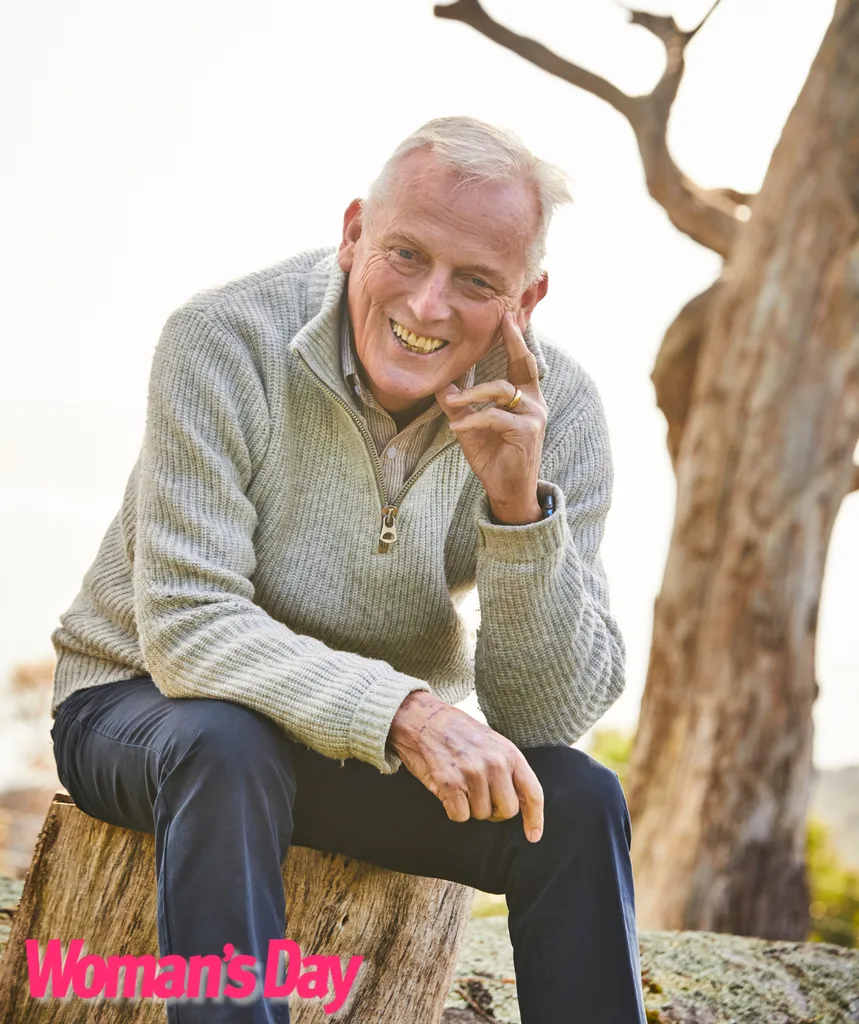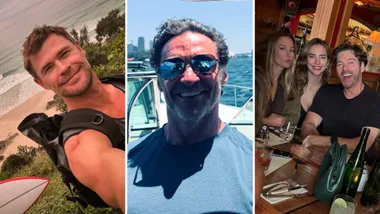If it weren’t for a fall at his Melbourne home that left him with two painful broken ribs and a broken coccyx, Sandy Roberts and his wife Carolyn may not have discovered that he was facing an even greater challenge.
“I didn’t feel like there was anything wrong with me,” Sandy tells Woman’s Day.
“I don’t think in hindsight I had any symptoms. Myeloma weakens the immune system and destroys your bone system and you have reduced kidney function. I had none of that. I had a couple of sore ribs from the fall and that was that.”
The diagnosis, in May last year, came just three months after the retired AFL and Olympic Games broadcaster, 73, had open heart surgery to replace an aortic valve and underwent a double bypass, emerging unscathed with no hint of what was to come.

The legendary commentator has opened up about his diagnosis.
(Image: Phillip Castleton)It was only after injuring himself moving furniture that doctors discovered he had myeloma, which is a rare blood disease that kills half of those who have it within five years. Fifty people are diagnosed with it every week in Australia.
“It’s a pretty cruel disease,” says stoic Sandy, who admits he and Carolyn had never even heard of myeloma before an emergency doctor told him, “Your ribs will be OK but you have cancer,” after a CT scan showed lytic lesions.
“You can understand what sort of shock Carolyn and I got when he gave us that news,” says Sandy.
“They can’t tell at the moment how long I’ve had the lesions or when they started or even what caused them.”

Roberts was a commentator for Seven’s Olympics coverage for over 20 years.
(Image: Supplied)POSITIVE THINKING
Fortunately, Sandy had Carolyn by his side throughout the ordeal to support and love him. Sadly, Sandy’s first marriage fell apart after the terrible loss of his 15-year-old son Sam, who died in 1993 after a five-year battle with AIDS contracted after a blood transfusion of HIV-contaminated blood to treat his haemophilia.
“Sandy’s heart was broken with Sam dying,” explains former sports agent Carolyn, 62, while Sandy admits what he and his first wife Hazel and their surviving son Ben went through was a nightmare no family should have to endure.
Sandy and Carolyn were blessed with a son of their own, Angus, 22, and with the joy that comes with being grandparents to Ben, 47, and his wife Jane’s three daughters, Indi, 16, Pip, 14 and Kitty, 12, who Sandy proudly says they love their AFL.
“Obviously it never goes away, but we’ve been very lucky – they are adorable kids,” says Carolyn.
Some would find it hard to find the silver lining after being diagnosed with an incurable cancer, yet Sandy remains very upbeat, believing in the power of positivity, and revealing that the diagnosis has brought him and Carolyn even closer together.
“I think we’ve definitely become closer as a couple since the diagnosis but I’m probably guilty of keeping things to myself too much. I’d like to think I’m learning by giving more to Carolyn so she understands how I feel.”

Sandy and Carolyn are staying strong.
(Image: Phillip Castleton)Carolyn says she can’t thank Myeloma Australia enough for the support it has given them both, revealing that on her dark days, she has reached out to the myeloma specialist nurses on the telephone support line that assists patients and their families.
“It’s a bit like you have this black cloud above you, it’s hard to explain,” she says. “It’s like a black cloud that hangs around – sometimes it clears. Rarely does it go away for good and sometimes a little bit of blue pokes through, but reality is the black cloud stays.”
Sandy had stem cells harvested in November but because of a reaction to his treatment and then a bowel infection, he was deemed not strong enough to have a transplant.
He is now on a drug regimen to treat the lesions in his back, pelvis and sacrum under the supervision of Professor Andrew Spencer.

“It’s not about me, it’s not about us.”
(Image: Phillip Castleton)STAYING HOPEFUL
The couple went public with Sandy’s illness to build awareness in the community about this blood cancer and raise vital funds for Myeloma Australia, which receives no government funding.
“It’s not about me, it’s not about us, it’s just about trying to educate people and make them aware this is happening and we need help,” explains Sandy, who has taken on the role of ambassador for Myeloma Australia.
He says haematologists are confident they can find a cure if they get funding for more research.
“At the moment I’m doing OK,” Sandy tells. “The only time there is any fear is when we receive the results of the blood tests each month because that determines just where my treatment’s going and where I am at the moment with the disease.

“You can go and hide in a corner and throw the towel in or you can try and be as positive as you can.”
(Image: Supplied)Sandy’s blood numbers have been trending in the right direction, giving the couple a much-needed boost, on top of the hundreds of messages of support they have received.
“You can go and hide in a corner and throw the towel in or you can try and be as positive as you can,” he says.
“I know we’ve both had tears at times but we’ve retained a positive attitude and I’m sure that’s helped us get where we are at the moment. The tough days are tough and the good days are good.”









